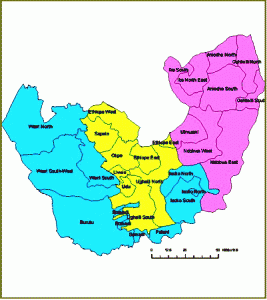Delta State government said it has invested N6.7 billion in its bid to eliminate extreme hunger and poverty in the state under the Millennium Development Goals conditional grant schemes.
Speaking, weekend, while briefing journalists on the activities of her directorate, Commissioner for Special Duties, on MDGs, Queen Mother Victoria Ikenchuku, said the state government spent N4.2 billion while the federal government contributed N2.5 billion within a period of four years.
She lamented that in spite of the developmental strides of the scheme, some communities in the state were rejecting projects aimed at developing their areas, while some, whom she described as miscreants in the communities, were stealing and vandalising MDGs materials from project sites as well as harassing project engineers.
She observed that some communities in the state prefer to collect funds meant for some projects and refuse to executive such projects, lamenting that despite that the state had since 2008 leveraged increased MDGs investments at the local government level and targeting the poor, the general attitude of host communities towards what they perceived as ‘government projects’ was poor.
She said this trend has become one of the greatest challenges facing the directorate in the execution of projects in the state, adding that some of the executed projects are not being put into use , owned, maintained and sustained by the communities in which they are located.
According to Ikenchuku, “the communities appear to lack ownership, maintenance and sustainability strategies and we have tried to encourage communities across the state to form community user group to manage and sustain all projects in their localities.”
She stated that the federal government has contributed the sum of N2.5 billion to the state MDGs scheme while the state government has also invested N4.2 billion as counterpart funding through the Conditional Grant Scheme of the project between 2008 to 2012 for the execution of projects and other related activities of the scheme.
She explained that the state government since 2008, have been able to strengthen existing primary health care facilities in the 25 local government through the provision of 50 maternity wards , 112 medical staff quarters, EOC equipment for 165 maternity wards, and 40,000 units of delivery packs.
She further said the directorate has also provided over 580,000 units of long insecticide nets, 666,732 doses of anti-malaria drugs as well as teaching aids to two schools of midwifery, and construction and renovation of classroom blocks in primary schools in the state.






